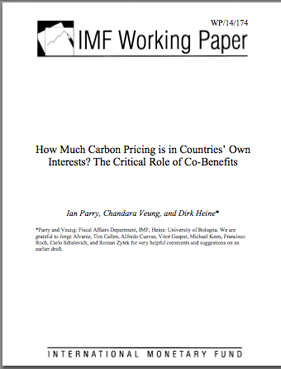$50+ a tonne carbon tax – coming to a government near you – soon

Forget global processes, taxing emissions unilaterally makes sense for governments and citizens alike argues World Bank research.
We all know that the climate pace is quickening – with the UN focusing on sustainability this December and climate change and the COP process in Paris 2015 meant to culminate in a global emissions agreement. Plus in 2016 the ICAO has agreed to come up with a global ‘Cap and Trade’ system for airlines.
Trust the World Bank to put a spoke in the wheel.
In a recently-released paper, World Bank researchers argue that unilaterally-imposed emissions taxes can provide substantial benefits for both governments and citizens now – rather than waiting for any global agreement.
National taxes, depending on emissions levels could range from $29.3 and $85.7 a tonne with the biggest emitters at the top of the scale and the lowest at the bottom.
The researchers argue that the move would raise tax revenue, allowing other taxes to be cut. It would also raise the price of anything that embodied carbon dioxide emissions.
Driving would become a bit more expensive, and this would reduce congestion and traffic fatalities. Coal-fired electricity would suffer a competitive disadvantage, and this would encourage a switch to cleaner energy, improving local air quality and saving lives. All these benefits would be enjoyed within national borders.
It is claimed that the tax would add less than 10 per cent to the cost of a return flight from London to Sydney and slightly more than 10 per cent to the cost of petrol in the US.
On the very positive side the effect of this new tax would reduce pollution-related deaths, road congestion, health-risk valuation – and deliver a whole list of active living benefits for people in a green economy – plus the tax would maximize energy security and dependence on international prices. The effect could be to future-proof green economies.
Plus it would have the advantage of assisting low emitters while mitigating against the big polluters.
And the researchers claim that this will only be a benefit for world trade – increasing GDP by around 2% in many
Say the researchers: "There has been much agonizing over achieving the collective benefits from addressing global climate change. However, pricing carbon dioxide (CO2) emissions from fossil fuel use can produce important national co-benefits."
"Most obviously, as carbon charges reduce use of coal, natural gas, and petroleum products, this reduces the amount of people killed by outdoor air pollution, currently estimated at 3.7 million a year worldwide. To take another example, if congestion, accidents, and other externalities from motor vehicle use are not fully internalized through other pricing policies, again there are potentially significant co- benefits to the extent that carbon charges reduce vehicle use. The potential for co-benefits suggests that countries need not wait on internationally coordinated efforts if some carbon mitigation is in their own national interests—that is, the domestic environmental benefits exceed the CO2 mitigation costs, leaving aside climate benefits.
So forget about the paltry $15/tonne emission costs envisaged by the EUETS and other global systems and look forward to a $50+ charge levied by national governments all for our own good – or will we get a double whammy?
Valere Tjolle
Great sustainable offers this week: 93% off reports and guides here Keys to sustainably successful destinations revealed here Going to WTM, want to attract high value green tourists? here
 United Kingdom
United Kingdom United States
United States Asia Pacific
Asia Pacific












































Dozens fall ill in P&O Cruises ship outbreak
Turkish Airlines flight in emergency landing after pilot dies
Boy falls to death on cruise ship
Unexpected wave rocks cruise ship
Woman dies after going overboard in English Channel